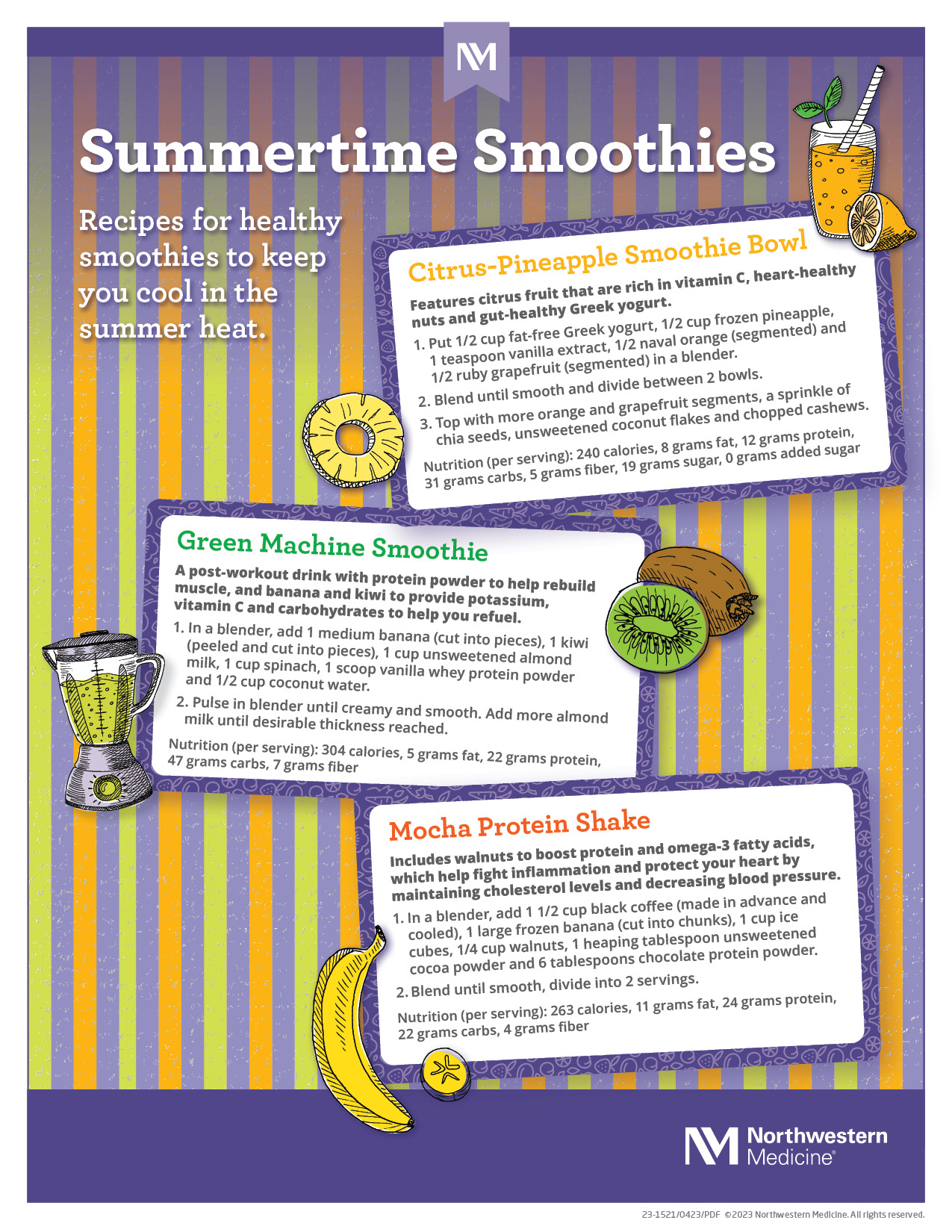6 Facts You Should Know About Smoothies
Redefine Your Drink
Updated May 2023
It's no secret that most people love smoothies; they taste good, boost your fruit and vegetable consumption and they are a convenient treat. Northwestern Medicine Dietician Hannah Gould, MS, RD, LDN, CDCES, explains what everyone needs to know about smoothies.
Fact 1: Smoothies have gotten more popular.
"We're all busy! If done the right way, smoothies can be an easy option for a healthy snack or a meal replacement in a pinch," says Gould. The COVID-19 pandemic has encouraged people to reflect on their health and whether or not they are getting the vitamins, minerals and nutrients that needed for optimal health and better immunity. Smoothies can be a quick and convenient option to increase the number of fruits and vegetables you eat every day. You can also easily add certain ingredients for a nutritional boost. "Smoothies with the right mix of ingredients can help you achieve your nutrition goals," she says.
Fact 2: What you put in your smoothie matters.
A smoothie's nutritional content depends on its ingredients. Fruit can add natural sweetness, fiber, vitamins and minerals. Aim for to have 1/2 to 1 cup of fruit (fresh or frozen) in your smoothies. Mildly flavored vegetables are generally the best type to use in smoothies. Spinach or kale are good choices because they provide more vitamins, minerals and phytonutrients, and their bitter taste is masked by the sweetness of fruit ingredients.
To add protein, include one these ingredients:
- Whey
- Soy or pea protein powders
- Plain Greek yogurt
- Unsweetened nut butters or nut milks
- Chia seeds
- Ground flax seeds
The right mix of ingredients can help you achieve your nutrition goals.— Hannah Gould, MS, RD, LDN, CDCES
If you use a protein power, check the ingredient list and make sure it includes specific types of protein (such as whey or pea) as the first ingredient. Choose a protein powder with a short or simple ingredient list. If your gastrointestinal system is sensitive, "Try to avoid protein powders with artificial sweeteners, flavorings, or added synthetic fibers since these may cause gas, bloating or diarrhea," says Gould.
Fact 3: Smoothies are healthy.
A well-made smoothie can be both tasty and healthy. One of the best nutritional benefits of a smoothie is the fiber content. Fiber offers a wide variety of health benefits such as:
- Supporting your regular bowel movements
- Helping your gastrointestinal system stay healthy
- Decreasing your cholesterol levels
- Stabilizing your blood sugar levels
- Helping to prevent disease
- Supporting you achieve and maintain a healthy weight
Unlike fruit juicing, fiber content is not lost when blended into a smoothie because you are consuming the whole ingredient rather than extracting part of it, like the juice.
Beware of claims encouraging the use of smoothies to detox your body. "There is no solid scientific evidence that supports the idea that detoxing is good for your overall health," says Gould. "Our bodies have their own system of detoxifying naturally." It is better to limit your intake of harmful, inflammatory foods, such as processed foods and added sugar, instead of trying to use smoothies to detox.
Fact 4: Smoothies increase your blood sugar.
"Anything that has carbohydrates causes your blood sugar to rise," says Gould. Since smoothies often include ingredients with carbs, "it is only natural for blood sugars to increase," she says. How much your blood sugar increases will depend on the serving size, amount of carbs in smoothie ingredients, and other smoothie ingredients that can slow digestion.
To minimize blood sugar spikes, avoid using fruit juice or concentrates as a liquid base and limit your portion to an 8- to 12-ounce smoothie. Juices remove the fiber of the fruit, leaving just water and concentrated sugar. Instead, use one of these options as the liquid base:
- Low-fat or fat-free milk
- Unsweetened almond or oat milk
- Green tea
- Water
Adding fiber or healthy fats can help slow digestion and reduce how much your blood sugar increases. Fruit, vegetables, chia seeds, flax seeds or nuts are good sources of fiber. For added healthy fats, consider adding avocado, Greek or Icelandic yogurt, or unsweetened nut butters.
Fact 5: There is not an optimal time of day to drink a smoothie.
The best time of day depends on your lifestyle and nutrition goals. If you are rushed in the morning, prep your smoothie in advance and bring it with you for an easy breakfast on-the-go. If you want a pre- or post-workout snack, a small smoothie with carbs and protein can help fuel your body and repair your muscles.
Having trouble sleeping? "You may want to incorporate a smoothie an hour before bed to serve as a sleep aid," Gould says. For pre-bedtime smoothies, include a mix of yogurt, milk, rolled oats, walnuts, tart cherries and bananas to enjoy their sleep-boosting properties.
Fact 6: Calories in a smoothie vary depending on the ingredients.
A homemade 8- to 12-ounce smoothie will contain roughly 175 to 450 calories depending on the ingredients and the portion, whereas a smoothie purchased out can quickly add up to more than 1,000 calories.
If you are looking for a new smoothie recipe, try some of these recipes from Gould.
 Download 6 Facts You Should Know About Smoothies
Download 6 Facts You Should Know About Smoothies





